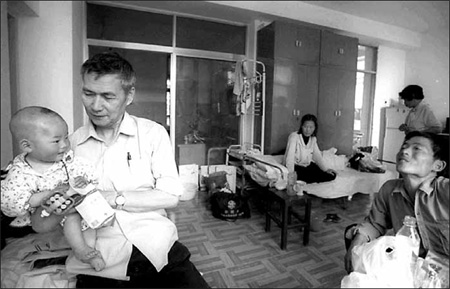Profiles
A fighter against AIDS in China
By Chang Ailing (China Daily)
Updated: 2009-11-09 09:38
|
|
"Dr Gui is honest, kind and gentle, and is always ready to help. Whenever we call and ask him to come to the village, he comes," says Zhao, whose wife and 6-year-old son are also infected with HIV.
After picking him up, Zhao takes Gui by his motor-pedicab directly to his home, where HIV carriers and AIDS patients are waiting.
"I cannot take him to the village clinic. There would be too many people there to see him. He might not be able to leave today."
As Gui sees his patients at Zhao's dilapidated house, Cheng Dong (not his real name) waits anxiously at the Shangcai County Hospital. Cheng's cousin with AIDS is in hospital. Cheng calls Gui and asks him to come. He also wants Gui's help in getting his daughter enrolled in a good local high school.
Cheng sees nothing inappropriate in his requests. He is sure Gui will help. He was among the first 10 HIV-positive villagers Gui diagnosed 10 yeas ago, and Gui has continued to extend medical and financial help ever since.
Despite his age, Gui works full time and spends most weekends and holidays visiting poor farmers, a routine he formed almost 50 years ago.
In 1960, the then medical graduate of 23, volunteered to work in the remote hinterlands of Qinghai province on the Qinghai-Tibet Plateau, answering the government's call for young intellectuals to work and settle in the frontier areas.
During his 16 years in Qinghai, he focused on curbing infectious diseases and endemics, such as measles, typhoid and plague. But as medical staff were scarce, he was surgeon, laboratory analyst, anesthetist and pharmacist.
He once amputated the seriously injured arm of a herdsman. "The man said I saved his life and was grateful to me. But I felt sorry for him, because a proficient surgeon with good facilities might have been able to save his arm."
Gui recalls visiting and treating the herders' families. "I didn't need Tibetan translators at that time because I spent so much time with them that I could speak Tibetan fairly well."
The bleak and wild plateau also served as a refuge for Gui from the turbulence of the "cultural revolution" (1966-76).
Gui was born to well-educated parents, both US-trained scholars. His father graduated from Princeton University with a doctorate in physics. His half-Chinese, half-Dutch mother graduated from Columbia University. They returned to China in the 1920s.
During the "cultural revolution", many Chinese with "complicated family backgrounds" or relatives overseas suffered persecution.
Despite his "problematic" genealogy, he could still go to villages and the pastoral regions and offer medical help to herdsmen. "I was on good terms with the locals, so I didn't suffer much," he says.
The experience taught Gui that doctors had to work in their communities, rather than wait in clinics for patients, a lesson he passes on to his students.
"Infectious diseases are not only medical problems, but also social problems. We must reach out to the people in need."
The same afternoon, Gui meets Cheng Dong and his cousin in Shangcai County Hospital. He reads the girl's medical records and offers advice to the resident physicians. He also discusses with Cheng his daughter's schooling.
As he is about to leave, a girl approaches him. "Dr Gui, could you please have a look at my mother? She doesn't feel well and has not eaten much for a week," she pleads. Without hesitation, Gui follows the girl to her mother's ward.
At about 4 pm, Gui has to leave for Zhumadian city to catch a train back to Wuhan. He apologizes to the families of patients who are still waiting to see him and promises to return.
On the bus to Zhumadian, he looks drawn. "Once I was able to see about 30 to 40 patients on a day like this," he says. "I am really inefficient now."
It is a comment that belies his strong sense of urgency. He describes himself as an "old farm ox", aware that its life is almost at an end but nevertheless plows on diligently.
He quietly recalls a colleague, a year his senior, who died suddenly a week ago, while eating at a restaurant. Gui attended the funeral the day before he left for Shangcai.
"His family was heartbroken at his sudden death. But I admire him. I think this is a good way to leave, without suffering much and burdening other people," he says.
"For people my age, this (death) is a natural thing," he says with a slight smile. "That's why I hope I can still do something. I may not have much time left."














